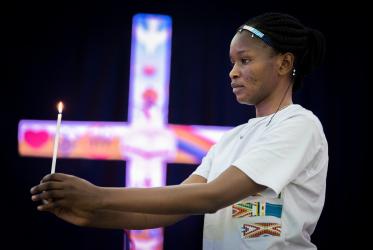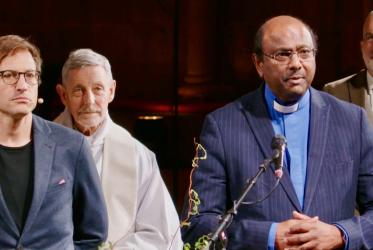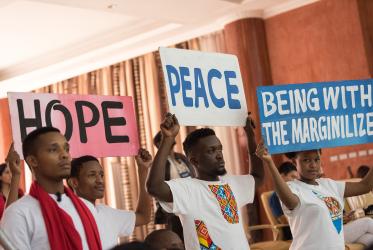By Albin Hillert*
As autumn is beginning to kick in, churches in Karlsruhe and across Germany are making headway in preparing to receive the World Council of Churches 11th Assembly in 2021.
Set on the bank of the Rhine near the French-German border in the state of Baden-Württemberg in Germany, Karlsruhe will receive in just under two year's time tens of thousands of Christians from all over the world, including delegates from WCC member churches, representatives of ecumenical partners, and any number of media representatives and interested public wanting to participate, learn and share what it means to be a Christian in today’s world.

A man studies the map of Karlsruhe, where the WCC's 11th Assembly will be held in 2021.
“There are high expectations in Karlsruhe, as people are very interested in being part of the assembly, and the region is very proud to host this event,” reflects Oberkirchenrat Dr. Marc Witzenbacher, who serves as local assembly coordinator for the WCC in the period leading up to the assembly – set to take place on 8-16 September 2021 under the theme of “Christ’s love moves the world to reconciliation and unity”.

Oberkirchenrat Dr. Marc Witzenbacher leads a local assembly office in Karlsruhe as preparations take shape for the WCC’s 11th Assembly.
“Yet people are also aware that this is not a local event, and not a German event, but a global event. This means an opportunity to learn from each other, from people from all over the world, and to bring different issues to the table and learn from each other’s experiences” Witzenbacher adds.

And the geographical position of Karlsruhe, combined with the history of the city in the past century, makes it an interesting venue for such a global encounter.

‘Human dignity is inviolable’, reads large letters on the Karlsruhe Opera house, citing the first article of the German Basic Law.
Participating in a WCC-convened workshop on Communication at the WCC 11th Assembly in end-September, Council of Churches in Germany (ACK) general secretary Dr Verena Hammes stresses the importance for ACK’s 25 member churches of hosting the upcoming WCC assembly in Karlsruhe.

Council of Churches in Germany general secretary Dr Verena Hammes (centre).
”This is a big deal for us, as we can emphasize how we have a very strong history of reconciliation in Germany, being the land of the Reformation, and also how we have managed through the ACK to find ways to work ecumenically on a range of important issues – to live ecumenism together here in Germany,” she explains.

Gathering representatives from churches and ecumenical partners across Germany, Dr Stephen Brown leads a session on Communication Rights in view of past WCC assemblies, as part of a WCC workshop on Communication and the WCC’s 11th Assembly.
”But the assembly will also be an opportunity for us, as representatives of other churches and international organizations are coming to Germany to share with us how they feel and live ecumenism in their different contexts,” Hammes adds.

Located by the Festplatz in central Karlsruhe, the Schwarzwaldhalle is one of those buildings that will help host delegates from WCC member churches around the world.
Meanwhile in Geneva, WCC colleagues and partners are working hard on plans and preparations for the meeting of what is the organization’s supreme legislative body.
In a word of reflection at the WCC’s annual ‘Staff Planning Days’, WCC programme executive for ecumenical continuing formation Rev. Dr Martin Robra shares, “In a way, as we look to a WCC assembly, it is very tempting to start thinking about how we can best advertise our work in different ways. But really, the assembly is a possibility for churches and their delegates to participate, and to do so in companionship with one another.”
“In the ecumenical movement we often have a tendency to think in terms of issues,” Robra adds. “But really, what we are is companions with people. Through this movement, you encounter realities that are not issues, but people. And that is why we are gathering in Karlsruhe.”
“The theme of the upcoming assembly, ‘Christ’s love moves the world to reconciliation and unity’, offers us such a breadth of opportunities, for reflection and ecumenical conversation,” continues WCC assembly coordinator Beate Fagerli.
“And while organizing a WCC assembly is a huge undertaking in view of logistics and practical planning, both globally and onsite in Karlsruhe, it is important that we do not lose sight of the greater vision – of an ecumenical movement discerning together how the way of Christ can lead to reconciliation, can lead to unity,” Fagerli concludes.
WCC planning committee: 11th Assembly in 2021 “Christ’s love moves the world to reconciliation and unity” (WCC press release of 16 January 2019)
WCC general secretary reflects on the ecumenical movement of Love
WCC releases theme for 11th Assembly: “Christ’s love moves the world to reconciliation and unity” (WCC press release 10 January 2019)
WCC 2021 Assembly set for Germany (WCC press release of 20 June 2018)
*Albin Hillert is communication officer for the World Council of Churches.







